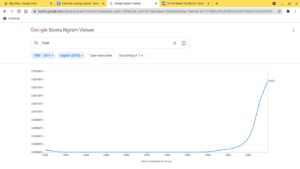We see cursing on TV, in movies, and books, we even hear our friends and parents do it. Since when have we used expletives this often and what will it do to the impact of the words themselves? (Photo in public domain)
In the past, cursing and using explicit language was a massive taboo. Now, however, culture has evolved so that cursing is a regular occurrence in people’s lives.
Throughout the 19th century and into the early 20th century, the use of blasphemies in daily life was virtually nonexistent. Take for example the English, four-letter word meaning to “ruin or damage something.” Looking at trends in its use, one can immediately notice an upward tick starting in roughly 1960. Similar growth has occurred in the utilization of almost all curse words, and today they account for “roughly 0.5 percent of the average speaker’s daily verbal output.”
The blue line on this graph represents the use of the f-word over time. Using Google’s NGram Viewer one can see other classic curses have a similar uptick in use starting in the 1960s. (Photo courtesy of Lauren Taylor)
To understand why the use of profane language has increased, we must first look at these words the same way people saw them in the past.
For a long time most people did not associate cursing with the high class, but with a lack of education and intelligence. The poverty-of-vocabulary hypothesis is the main cause of this belief; it states that people curse when they lack the ability to find a proper — more neutral — word to describe the situation.
Although a study done in 2015 by psychologists Kristen and Timothy Jay proved this theory wrong, the experiment is not why expletives spiked in our daily use. The main reason profanity is used so frequently is because society relaxed.
Just like fashion is increasingly more casual than it was in the past, so is our language. Women no longer wear stockings and dresses every day, and people are no longer afraid to use crude words.
The issue with using these words is that we run the risk of overusing them.
“I think that some curse words and the context they are used in will have the same impact however depending on context most will be used into extinction,” said Elizabeth Neil, a student at Leesville Road High School.
Now, all we can do is wait and see if curse words will continue in the direction of being used until they are insignificant, or if the taboo meanings behind the words will keep them from doing so.

Hi! My name is Lauren! I’m President of the LRHS book club. Outside of school I’m a curler for Team Taylor and I like to rollerblade.


Leave a Reply